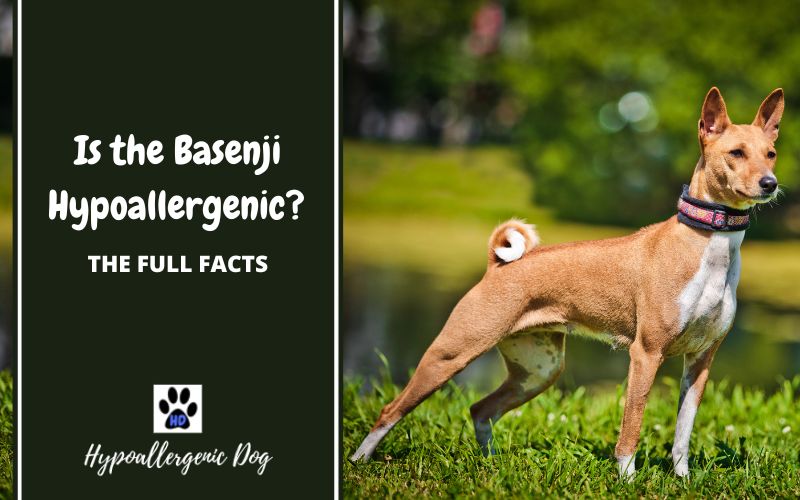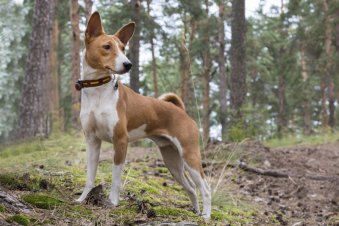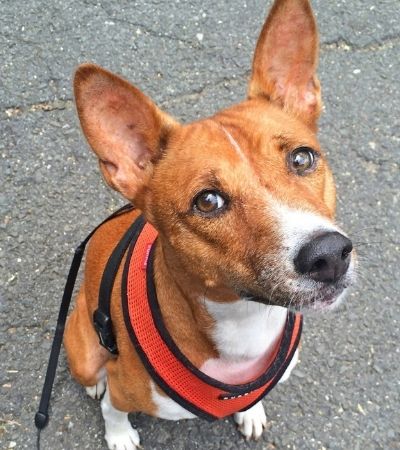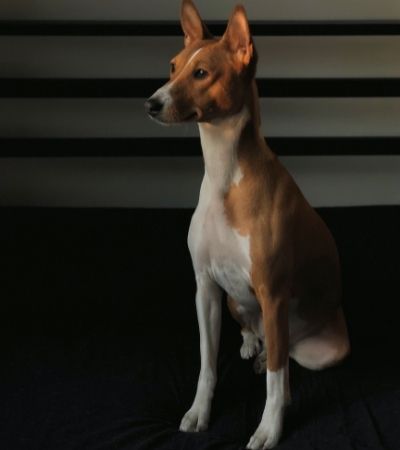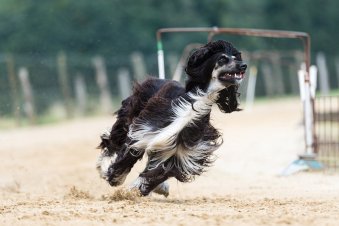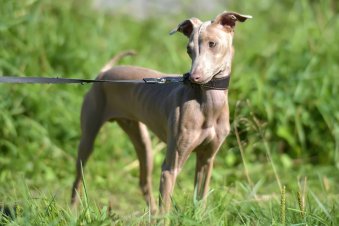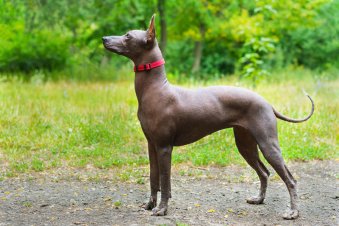Are Basenjis Hypoallergenic?
Yes! The Basenji is a small to medium hypoallergenic dog breed that hardly sheds or drools.
The Basenji is a small, sleek site hound whose breeding stock originates from the Congo in Africa. These dogs are suspected to date back to 4,000 BCE, as evidenced by Egyptian artwork. This breed is so ancient that genetic testing has revealed that they may be one of the original dog breeds from which many of our modern dog breeds were created. Their short, tightly curled tails, and large pointed ears give them a distinct appearance. However, their personality is even more unique than their looks.
The Basenji is a cat-like dog with an aloof, independent attitude and elegant poise. They have low dander, shed very little, and even have a tendency to groom themselves! This breed shares some traits with wild dogs. Like Dingos and New Guinea singing dogs, Basenjis only have one mating season a year. They also don’t have much of an odor, and like other wild dogs, they have a variety of vocalizations they use instead of a bark. In fact, their go-to sound is a strange yapping, howling noise that has become known as a “yodel”. Their inability to bark has earned them the name “African Barkless Dog”.
For a quick summary of the Basenji skip to our Basenji dog breed summary further down the page.
View more hypoallergenic dogs here.
Is the Basenji a Hypoallergenic? Contents
Basenji Quick Facts
About the Basenji Dog Breed
Basenji Training and Exercise
Basenji Grooming and Care
Basenji Health Issues and Care
Conclusion
Basenji FAQ
Basenji Facts Summary
Basenji Quick Facts
| Hypoallergenic Dog: | Yes! |
| Shedding: | Low shedding |
| Drooling: | Low |
| Size: | Slightly smaller than medium-sized |
| Breed Group: | Hound |
| Lifespan: | 12 – 16 years |
| Energy Level: | High |
| Trainability: | Low |
| Family Dog: | Sometimes |
About the Basenji Dog Breed
The Basenji Physical Characteristics and Coat
(Skip this section)
The Basenji possesses a sharp silhouette with upright, pointed ears, a long snout, and a tightly curled tail. They have a square shaped body which is about as long as it is tall. All basenjis have white feet, white chests, and white tips on their tails. They also have distinctive wrinkles on their foreheads which become more prominent when they are excited. Their soft, almond-shaped eyes are alert, and their hair is short and sleek, and they only shed a little.
These dogs are ideal for fastidious owners and “neat freaks”, because aside from the fact that they shed very little, they also enjoy grooming themselves, much like cats do. Combining this with their low dander levels makes them an ideal candidate as a pet for people with dog allergies.
Basenji Temperament
The Basenji’s intelligence is widely debated. They are very difficult to train, owing to their extremely independent nature. The intelligence of most dog breeds today is measured in terms of how readily they can learn, and respond to a command – which puts Border Collies at the top of the list, followed closely by Poodles. Some people feel, however, that a dog’s ability to recognize that it doesn’t have to respond to commands if it doesn’t want to, as being a mark of greater intelligence than blind obedience.
Expect a Basenji to consider itself to be more of your equal than your follower. These dogs are likely to consider what you would like, and then choose whether or not they agree. They certainly have a “mind of their own”. They do, as many sources on the internet will claim, possess a uniquely cat-like nature. They enjoy curling up sofa and enjoy sharing space with you.
Basenjis are often decent at being alone, unlike other dog breeds, but they should always be crated when left unattended. The breed has a strong instinct to run, hunt, and chew. If bored and unsupervised, they are likely to cause havoc – destroying things you never dreamed could be destroyed, with the speed and skill of an Olympian.
Most websites over-emphasize the Basenji’s aloof nature. While many do possess an independence and a sense of their own agenda, rather than an overt friendliness common in a breed like a Golden Retriever, they are by no means unfriendly. The temperament of these dogs vary greatly from one to the other, but most Basenjis are quite sociable.
Are you considering adopting a Basenji?
- Here’s what you should know :
- Basenjis are very neat dogs that usually groom themselves and rarely need to be bathed. However, they can also be VERY destructive, especially if left unattended.
- They are usually very outgoing and friendly, and they get along well with people, despite all of the information online that accuses them of being overly “aloof”. However, early socialization is crucial for Basenjis and they are not the best dogs for small children, or dog parks.
- This breed doesn’t bark, as you probably know by now! They do, however, “yodel”, which can be arguably more obnoxious than a bark! Most Basenjis are very quiet, but some can be very vocal dogs. Keep that in mind if you live in an apartment.
- These guys are excellent city-slickers! They’re small, and have cat-like mannerisms. However, they also need a LOT of exercise! Don’t be fooled by sites that tell you otherwise! An under-exercised Basenji is a creative wrecking ball.
- Basenjis are one of the most difficult dogs to train. Even a well trained Basenji is likely to ignore its owner if they feel they have good reason to do so, and harsh criticism or physical punishments have little impact on their judgement. It is unanimously agreed on the internet, and by Basenji owners alike that these dogs cannot be trusted off-leash, anywhere. They are also very clever at escaping enclosures.
Basenji Training and Exercise
Encouraging Good Behavior In Your Basenji
Basenjis are one of the most difficult dog to train. They are one of the least people-pleasing breeds you can imagine, with few innate tendencies to comply with what you’ve asked of them, simply because you’re the one doing the asking. Criticism and reprimanding simply has no effect on the Basenji, who really cares very little about your personal opinion on the matter.
Sam Anderson, an owner of 7 Basenjis, wrote in his article:
“If there is something that you′re trying to discourage your dogs from doing set up strategic “booby traps” that surprise them into thinking that the reaction to their behavior will be unpredictable. (For example, my dogs took to getting in the shower after I got out to lick the water off the bottom. This usually left doggy foot prints on the bottom and I worried about danger to them if I used a cleaning product that weren’t 100% gone. The solution was easy: I would sneak in and turn the shower on them. And since Basenjis hate water, well, that solved that problem. All other forms of behavior modification had failed.”
(https://www.basenjirescue.org/reality%20stories/Good-Bad-Ugly.htm)
Exercise Needs Of A Besenji
These dogs need plenty of exercise. Most sources online underestimate the amount of exercise a Basenji needs to be mentally healthy and relatively obedient. Unfortunately, Basenjis cannot be trusted off leash in an area that is not securely enclosed. Their extreme prey drive, speed, and their unwillingness to change their course of action due simply to the fact you disagree with it, means that when these guys bolt – they’re gone, and they’re very hard to get back.
A 40-minute walk is adequate for a Basenji, but be prepared to supplement their physical exercise with very, very durable dog chews or other fun mental activities. Do not leave a Basenji unattended in even a fenced in yard, because they are notorious mischief makers. The better solution is to train your Basenji to run on a treadmill, or run along-side your bike, and provide them with two sessions of intense exercise a day.
Basenji Grooming and Care
Maintaining Your Basenji’s Coat
Basenjis are a very low maintenance breed. Their hypoallergenic coat sheds very little, and they are particularly clean animals. A hound glove is a type of rubber brush that can be used on short-haired hounds to remove shed hair. They are a good option for the Basenji, but they aren’t necessary. Like all dogs, this breed should have their nails clipped about every two weeks and their teeth brushed at least once a week. Their ears require less attention than other breeds because they are upright rather than folded over, so they have plenty of access to fresh air which helps them avoid ear infections.
Health
Basenji Health Issues and Care
Unfortunately, there is not much statistical evidence to give a proper picture of how healthy the Basenji breed is. Very few surveys have been done to collect enough data in this regard, so there may be other health issues that are not listed here.
Fanconi Syndrome
One concern to be aware of with the breed is Fanconi syndrome. Fanconi syndrome is very rare in dogs, but is more common in Basenjis, who appear to contract it genetically. Statistics suggest that about 7% of the breed’s population is affected by this illness, which is quite high, given the severity of the problem if it is undiagnosed. If left untreated, this syndrome can lead to renal failure and death. However, there are various ways to detect the issue in its early stages before it manifests, and in those situations the prognosis is usually a positive one!
Changes in diet and the use of supplementation can help dogs that have this problem live a normal life. Symptoms don’t appear until the dog is around 4 years of age, so be sure that the breeder you buy your puppy from has had the parent’s DNA tested for Fanconi syndrome. If you rescue a Basenji from a rescue organization, you can have their DNA tested yourself if they are under 10 years of age (if they are older than that, they don’t need to be tested).
If you would rather not do a DNA test, there are urinalysis strips that you can use to test your dogs urine for glucose. These strips are “Bayer Diastix Reagent Strips for Urinalysis Glucose” – be sure to get the urinalysis test strips, and not the blood test strips. By testing your dogs urine monthly, you can catch the early symptoms of Fanconi syndrome and begin a nutritional plan with your veterinarian right away!
Basenji Enteropathy
Another condition to be aware of is Basenji enteropathy, which affects approximately 1% of Basenjis. This disease causes your dog to have difficulties processing the nutrition they get from their food, and can cause digestive problems similar to that of irritable bowl syndrome. Dogs may suffer from diarrhea, gas, lethargy, depression, changes in appetite, malabsorption of nutrients, nausea, and vomiting. This is a lifelong condition, but the frequency of symptoms may decrease over time. Your veterinarian can help you devise a dietary strategy, or provide antibiotics, that can help your Basenji with their digestion.
Even though the chances of your pet contracting this disease seem rare, it is important to be informed of their predisposition to it. Symptoms of this problem be easily misdiagnosed as pancreatic insufficiency, so when chronic digestive symptoms manifest in your Basenji, you should first have a blood test conducted to rule out Basenji enteropathy (also known as IPSID).
For more information about Basenji health concerns, please click here or go to https://www.basenji.org/PUBLIC/BasenjiHealthPages.pdf!
Common Health Issues for Basenji
Basenji enteropathy
Corneal Dystrophy
Fanconi Syndrome
Canine Hip Dysplasia (CHD)
Hypothyroidism
Patellar Luxation
Persistent Pupillary Membranes (PPM)
Progressive Renal Atrophy
Pyruvate kinase (PK) deficiency (Red blood cell disorder)
Umbilical Hernia
Conclusion
The Basenji has very unusual characteristics that are hard to find in other dog breeds! These ancient dogs are, in some ways, more wild and untamed than modern house pups. They have a willful, independent sense that defies domestication and makes them one of the most difficult breeds to train. These dogs can be extremely destructive, especially if bored, or under exercised. Like wild dogs, they yip and yodel rather than barking.
However, Basenji are also hypoallergenic – light shedders and notoriously clean, as they will usually take care of their own grooming needs. They can also be very affectionate, friendly, playful dogs, and their playfulness is undaunted by old age. Although there is not as much statistical evidence surrounding the health of the Basenji, it would seem that they tend to have less health problems than popular purebred dogs, and some of their more serious problems can be reasonably managed by changes in nutrition. If you’re looking for a conveniently sized, self-thinking dog with a lot of ‘go’ to start the day, this ancient feline-like canine could be your uniquely perfect fit!
Basenji FAQ
Are Basenjis rare?
Yes! Basenjis are quite rare.
Are Basenjis affectionate?
Although their personalities differ a lot, most Basenjis are very friendly and love to be near you.
Are Basenjis smart?
This is a subject of debate! There was a study done on dog intelligence that ranked them as one of the stupidest dogs because they wouldn’t respond to commands. However, in this author’s opinion, they are extremely intelligent. Basenji owners will happily share with you numerous stories in which their dog figured out how to operate or manipulate man-made things to get their way. Their lack of obedience stems more from their “what’s in it for me” attitude than a lack of comprehension. They are also quick to potty-train – which seems to indicate intellect!
Are Basenjis good with cats?
It would be hard to trust a Basenji with your cats. The best idea would be to raise them with one, however, you may still not be able to trust them around strange, or new cats. A lot would also depend on the cat. If the cat runs when it sees a dog – a Basenji will almost certainly chase it. These dogs are more wild-hearted than most breeds, and their prey drive is very high.
Are Basenjis protective?
Sort of! Basenjis are very alert dogs and won’t hesitate to sound the alarm. They are not, however, “attack” dogs. Basenjis vary greatly in personality, so some may fight on your behalf, but most are more likely to run or use you as a human shield!
Are Basenjis good with other dogs?
For the most part, yes. However, they do best with dogs that have similar traits and characteristics. They are more likely to be friendly to another hound dog than a toy dog or a terrier. Socialization needs to start as soon as they get their vaccinations!
Are Basenjis good apartment dogs?
It depends. The internet is awash with links that will tell you these dogs are the epitome of apartment dogs, but I tend to disagree. While they are very clean, cannot bark, and there are a lot of Basenjis that are naturally quiet – they can also be something like “canine rototillers” for a house left unattended. They can be very creative when it comes to destroying things. They also need ample amounts of exercise, and the less their exercise needs are met, the more bad habits they’re likely to engage in. Basenjis can be very alert dogs, and while they can’t physically bark – they can definitely make themselves heard in a way that your neighbors may feel is worse than barking. If you plan to have one in an apartment, plan to exercise them for 40 minutes a day, and crate them when you leave the house.
Are Basenjis hypoallergenic?
Yes! They produce much less dander than other dogs. They do, however, shed a little. Their hair is very short so it’s often not too noticeable unless it’s against a contrasting background. They clean themselves, so that helps.
Are Basenjis good running dogs?
They are excellent running dogs!
Is the Basenji right for me?
Honestly – probably not. Especially if you have to ask! While they are very cool dogs, they are also very difficult dogs. They are best handled by someone who has a good understanding of the nature of independent dogs, and a great sense of humor! They’re best suited for a person who will take them jogging or biking, has a very clutter-free home, and is willing to spend a lot of time with them and supervise them properly.
Do Basenjis bark?
No! Basenjis can’t physically bark. Instead, they yodel. They sound more like Coyotes than dogs!
Do Basenjis like to swim?
Basenjis aren’t known to be avid water-lovers. If swimming is important to you, you can encourage your Basenji to play with other dogs that love the water, but whether they will take to it is hit or miss.
Do Basenjis howl?
Yes! However, how much they howl varies a lot from dog to dog. Some Basenjis are quite quiet and others can be very vocal.
Do Basenjis smell?
Not really. Basenjis don’t have a distinct “dog odor”. That’s a quality that’s pretty common in hypoallergenic dogs.
Do Basenjis like to cuddle?
It depends on the dog, but for the most part – yes! If cuddling is your thing, get your Basenji as a puppy (from a good breeder) and cuddle them often from a young age. It helps to turn them on their backs and touch their ears, face, and paws too.
Basenji Facts Summary
| Breed | Basenji |
| Other Names? | Congo Dog, Congo Terrier, African Bush Dog, African Barkless Dog, Ango Angari, Zande Dog |
| Hypoallergenic? | Yes |
| Height | Male: 16–17 inches (41–43 cm), Female: 15–16 inches (38–41 cm) |
| Weight | Male: 22–26 lbs (10–12 kg), Female: 20–24 lbs (9–11 kg) |
| Lifespan | 12 – 16 years |
| Temperament | Affectionate, Energetic, Alert, Curious, Playful, Intelligent |
| Colours | Black, Brindle, Blue Belton, Tan, Tri-color |
| Coat – describe the coat | Short, single-coated, and sleek |
| How much grooming? | Minimal, they often groom themselves and rarely need to be bathed. |
| How much shedding | Lightly only during shedding season |
| Dander levels | Low dander level |
| Saliva – Do they Drool or Lick much? | Low |
| Energy levels | High |
| How much exercise do they need? | 30-40 minute walk daily |
| Health problems | Hip Dysplasia (CHD), Corneal Dystrophy, Patellar Luxation, Progressive Retinal Atrophy (PRA), Fanconi Syndrome, and Basenji Enteropathy, Umbilical Hernia, Persistent Pupillary Membranes (PPM), Pyruvate Kinase (PK) Deficiency, Hypothyroidism |
| Good for apartment? | Yes, so long as they get enough exercise |
| Suitable for kids? | Not with young kids |
| How much do they bark? | Never, they are one of the few barkless dogs. Instead, they yodel. |
| Can they be left alone? | No, they can get very destructive when left alone. |
| Intelligent? | Clever, but with an intelligence that is not always obvious |
| Trainable? | Low Trainability – They are very independent |
| How popular as a pet? | AKC rating is 88/194, so they are quite unusual. |
| Any other important facts? | There is evidence to suggest that these dogs may date back to 4000 BCE, but the modern breed was originally found in the congo. |

